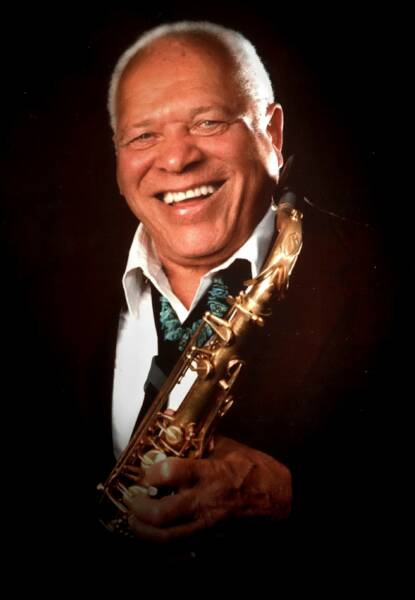Chicago Sun Times
December 19, 1989
The Jass Train Keeps on Rolling
Author: Dave Hoekstra
Traditional-jazz clarinet and saxophone player Franz Jackson named his first band the Original Jass All Stars because jass is a derivative of the French verb jaser (to speed up). Further on down the line, he played with effervescent bandleader Fats Waller, trumpet player Roy "Little Jazz" Eldridge and Fletcher Henderson.
Jackson, 77, has outlived all of them.
"I did most everything my peers did, but I got off the train before it got wrecked," Jackson said between sets at Dick's Last Resort, 435 E. Illinois, where he plays at 9 p.m. every Tuesday. (He also performs at 8 p.m. Thursdays at Pops for Champagne, 2934 N. Sheffield, and every other Friday in "Jazz at Noon" sets at Andy's, 11 E. Hubbard.) He commutes to the gigs from his 10-acre farm in Michigan, where he lives with his wife and two children.
Jackson is still quick with a quote. When asked about the consuming life of the 1940s and '50s jazz musician, he said: "It's the life I've lived all my life, so I don't say it's an abnormal life because it's normal to me."
Jackson's mental disciplines mirror his measured playing. He's a native of Rock Island, where his mother studied philosophy and told him to follow "the mental path."
"You might go a little bit to the left and a little bit to the right," Jackson said. "But you always come back to that straight line. She taught me how to live, how to eat and how to be."
Because of the predominant clarinet and trumpet (and the presence of fine local trombonist Jim Beebe) in a honky-tonk atmosphere like Dick's, Jackson's sound is sometimes confused with Dixieland. But where Dixieland tunes are repetitive (Jackson has been known to call it "blues with a straw hat"), traditional jazz is more adaptable.
At Dick's tonight, Jackson will go note to note with Beebe, mixing his spicy reed playing with salty vocals on tunes such as "St. James Infirmary" and "Struttin' With Some Barbecue," which in recent years has become Jackson's signature song. The traditional sound is supplemented by the piano playing of Joe Johnson, bassist Jimmy Johnson, drummer Greg Sergo, trumpet player Bob Neighbor and vocalist Judi K.
"I like the elaboration of small groups," Jackson said. "Jazz can be played more effectively with a small group. A big band merely frames the soloists and lifts them up. That's why I liked working with Eldridge (between 1937 and the 1950s). Everybody had worked in big bands, and you were playing free. You'd just take an idea and everybody would fall right in. It's not like reading music, because you're absorbing someone else's thoughts. And once you got their thoughts, they become yours and you are able to build on them."
Jackson's first break came when a Milwaukee jazz player named Shuffle Abernathy came to Chicago, looking for a saxophone player. He found a 17-year-old Jackson playing at a club at 31st and State Street and signed him up. Between gigs with Abernathy, Jackson was part of occasional excursions to the South with New Orleans jazz musicians who had migrated to Chicago.
"We ballyhooed on a truck and would go to Memphis and then to New Orleans," Jackson said. "We'd take an empty mail cart, put a piano in it, and put it on the truck - (boogie-woogie master) Albert Ammons was one of the piano players - and then we'd have a banjo player and a drummer. And there would be a bar. When we'd stop, people would come up to the truck for a drink. We'd do that all the way to New Orleans. When we'd get to New Orleans, we'd give a dance, stay the night and come back the next day."
With 60 years of ballyhooing and bars under his belt, Jackson picks "this place" (Dick's Last Resort) point-blank as the craziest joint he has played.
"In older days, things were like the line about `I don't give you none of my jelly roll.' There were always double entendres. There was finesse. But here. . . . This is a place where you say it like it is. That's the way it is now."
And the dignified strut of Franz Jackson is the way it should be.
